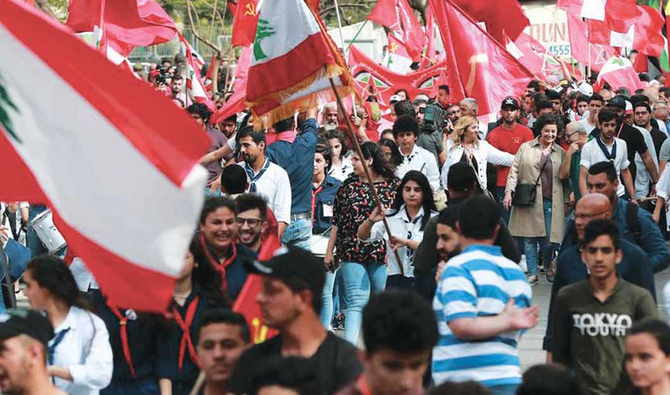
by NAJIA HOUSSARI – arabnews — BEIRUT: Thousands of public and private-sector workers in Lebanon are expected to down tools next week in a national strike over crippling government spending cuts. Members of the country’s General Labor Union, which includes 43 unions and federations, will join a walkout on Wednesday in protest at the latest austerity measures. Union leader, Bechara Al-Asmar, told Arab News: “This national strike is the beginning of the broadest moves the country will witness against the removal of state subsidies for basic materials. “We are shouting in everyone’s face. We cannot stand by. If they (the country’s political leaders) form a government, there is no need to strike, but what is happening is further deterioration. “The poverty rate in Lebanon, according to international statistics, has reached 75 percent, and these people receive 1 million (Lebanese) pounds ($660), which is no longer sufficient to pay an electricity bill, while the extreme poverty rate has risen to 40 percent. “In the tourism sector alone, the total number of people who have lost their jobs has reached 110,000, and if banks implement the Central Bank’s circular for merging, 10,000 employees will become unemployed and there will be no job opportunities for them in light of the closure of other institutions,” Al-Asmar said.
There were angry street protests in Sidon following an announcement by Ali Ibrahim, head of the Union of Bakeries Syndicates, that the state had stopped subsidizing flour. Demonstrators blocked main roads and in Hermel tires were set alight outside the government palace. One protester told Arab News: “I used to buy a thyme pie (a cheap popular food) for 1,000 Lebanese pounds. Today, after announcing the lifting of subsidies, they went up to 2,500 pounds. How can the poor survive? What awaits us next?” During a press conference, Shadi Al-Sayed, head of the Public Drivers Syndicate in northern Lebanon, said: “The spark of anger will be from Tripoli if the ruling authority in Lebanon decides to kill the citizen in his livelihood.” He warned of street protests until “matters returned to normal.”
The Lebanese pound has lost 80 percent of its value since the beginning of the financial crisis in the country last year and Lebanese banks have imposed restrictions on their customers’ deposits. Revenues are expected to decline sharply, as tax and non-tax income continues to fall due to the downturn in economic activity in Lebanon. Hassan Diab’s caretaker government on Tuesday organized workshops to rationalize subsidies for fuel, flour, and medicines. A government source told Arab News: “Diab refuses to hold his government accountable for the consequences of the decision to lift the subsidies.” Addressing the workshops, Diab said: “The caretaker government did not intend to lift the subsidies, but rather our approach is to rationalize the subsidies. Basic life matters for the Lebanese citizen, such as medicine and flour, are a red line for us. “The difficult economic and financial conditions that Lebanon is going through are the results of many years of bad policies,” he added.
The workshops have been given a week to “complete a clear project” for tackling the financial crisis. Al-Asmar said: “Instead of seeking to retrieve the looted funds and put an end to persistent corruption, the state is resolutely tending to lift subsidies on types of flour and will lift fuel subsidies by 40 to 60 percent in preparation for lifting it completely, while politicians and the Prime Minister-designate (Saad Hariri) are still procrastinating in forming the government, although it is the only passage for any international support for Lebanon.” Head of Lebanon’s parliamentary health committee, MP Assem Araji, said the government hoped “to save $250 million through rationalizing the subsidies of medicines.” George Brax, a member of the Lebanese Syndicate of Gas Station Owners, said: “Diab is trying to find a solution by securing the import of fuel from a foreign country (thought to be Iraq) without paying directly.”
Lebanese President Michel Aoun and Hariri on Wednesday held a second meeting within the space of 72 hours but failed to move forward with plans for the formation of a new government. The Council of the EU expressed its growing concern about “the serious financial, economic, social, and political crisis that has taken hold in Lebanon and has continued to worsen in recent months.” In a statement distributed by its embassy in Beirut, it said: “The EU calls on Lebanon’s political leadership to listen to the people as they articulate their aspirations and concerns, to take their demands seriously, and harness their inputs and implement reforms without further delay.



